Sowing a Sustainable Future
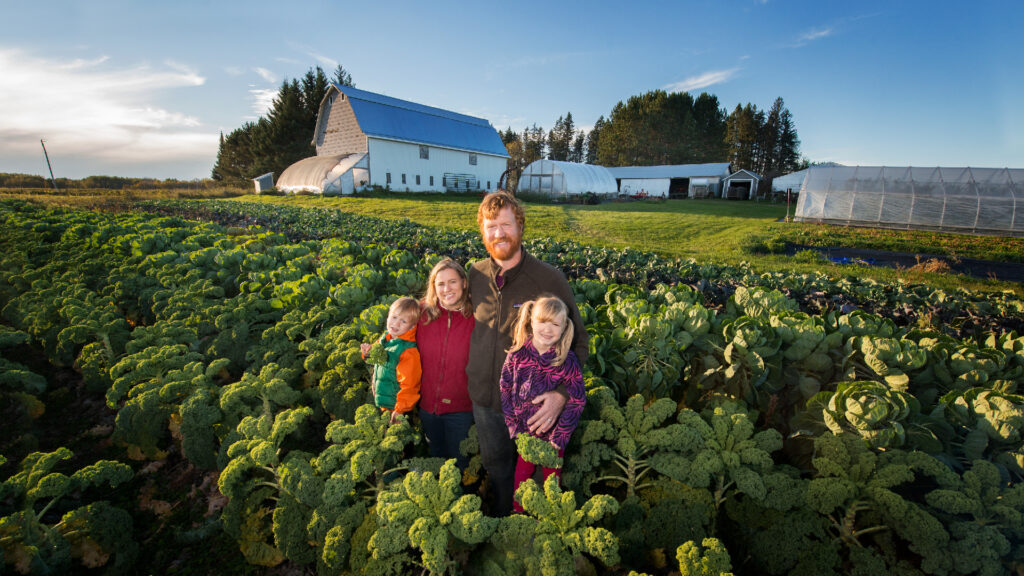
A Check-in with the 2020 Lakewinds Organic Field Fund Recipients
The Lakewinds Organic Field Fund (LOFF) is our co-op’s grant program designed to help local sustainable and organic farmers achieve their on-farm goals – with over $500,000 awarded since 2011.
In 2020 alone, Lakewinds provided more than $109,000 in LOFF grants to 15 local farms. Those grants supported projects like improvements to pack sheds, purchasing equipment, improvements to infrastructure like irrigation, refrigeration, and fencing, and more.
“This grant program allows us to support smaller organic farms, which is a key element in our effort to cultivate a vibrant and sustainable local food system.” – Dale Woodbeck, Lakewinds general manager
We caught up with some of the 2020 LOFF grant recipients to find out how those funds helped them complete projects on their farms.
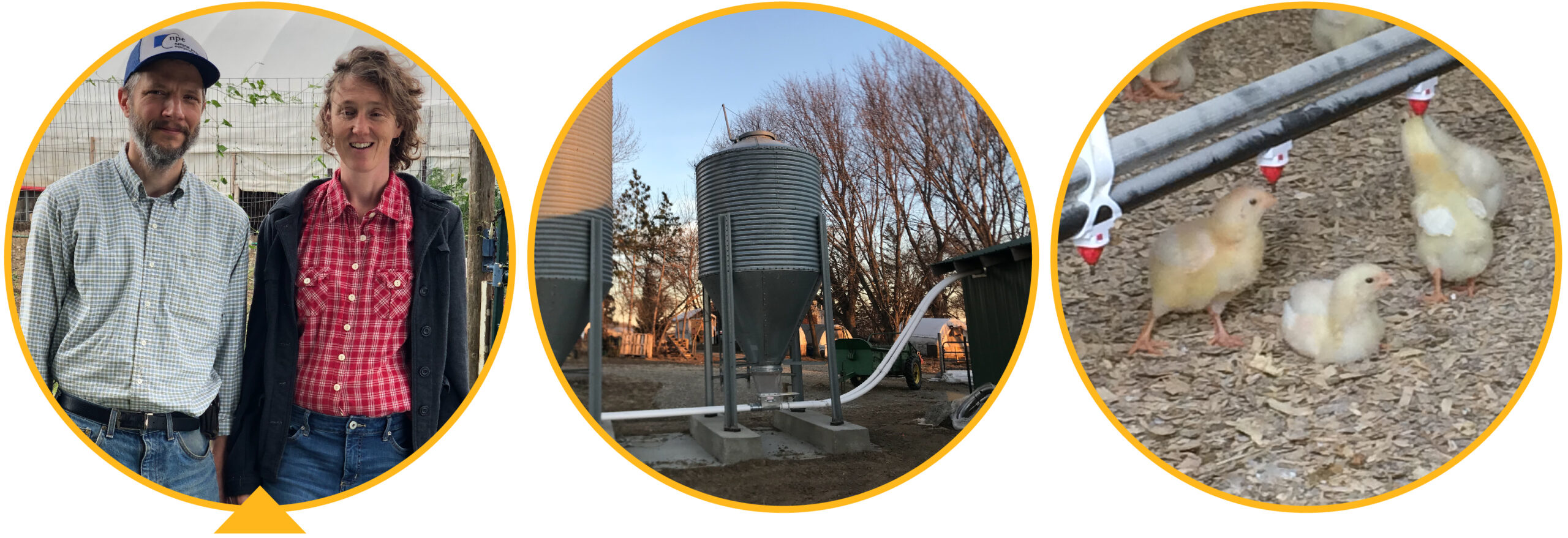
Auntie Annie’s Fields
Farmers: Ian Rhodes & Elizabeth O’Sullivan
Dundas, MN
Project: Automated feeding system and improved water system in their brooding barn, to streamline feeding and provide cleaner water to the chicks.
Total funded: $8,000
How has the completion of the project affected your farm?
We can already see the way the new water system has improved life for both us and for our birds. Clean water is very important for [chickens] all their lives, but especially when they are so young and vulnerable.
This watering system has improved the quality of the bedding and, as a result, the air. Because these waters have very little leakage, the bedding stays dryer. Because the chicks can drink water at so many places throughout the barn now, their waste is better distributed instead of being more concentrated around the waterers. All this helps keep bedding dry, which protects the birds from sickness. Dryer bedding with fewer germs also improves the air quality, which increases chicks’ quality of life and gives additional protection from illness.
Our numbers confirm that the water systems helped our chicks’ health this year. Mortality through 3 weeks of age has been 2% consistently with new water set-up. Some previous flocks were 4-6%, largely due to chicks getting wet in waterers.
What would you like to say to co-op shoppers?
We couldn’t do what we are doing without you. We have poured so much of our lives into this farm because we believe that what we are doing makes a small difference, but we only have something to show for our work because we’ve had help and support.
Our elders came from a tradition of agriculture that was grounded in a much more sustainable system – a system that had supported them generation after generation. Since I was a child, hearing the stories my mother told about her family’s farm, I wanted to be part of keeping that tradition alive. I wanted to develop a strong relationship with the land that honored it and that honored the memory of those who came before us.
Ideally, food would be produced with a sense of connection and gratitude because producing food is a spiritual job, just as eating food is always spiritual. Eating represents an exchange of life for life, even when the life being consumed comes only from the plant kingdom.
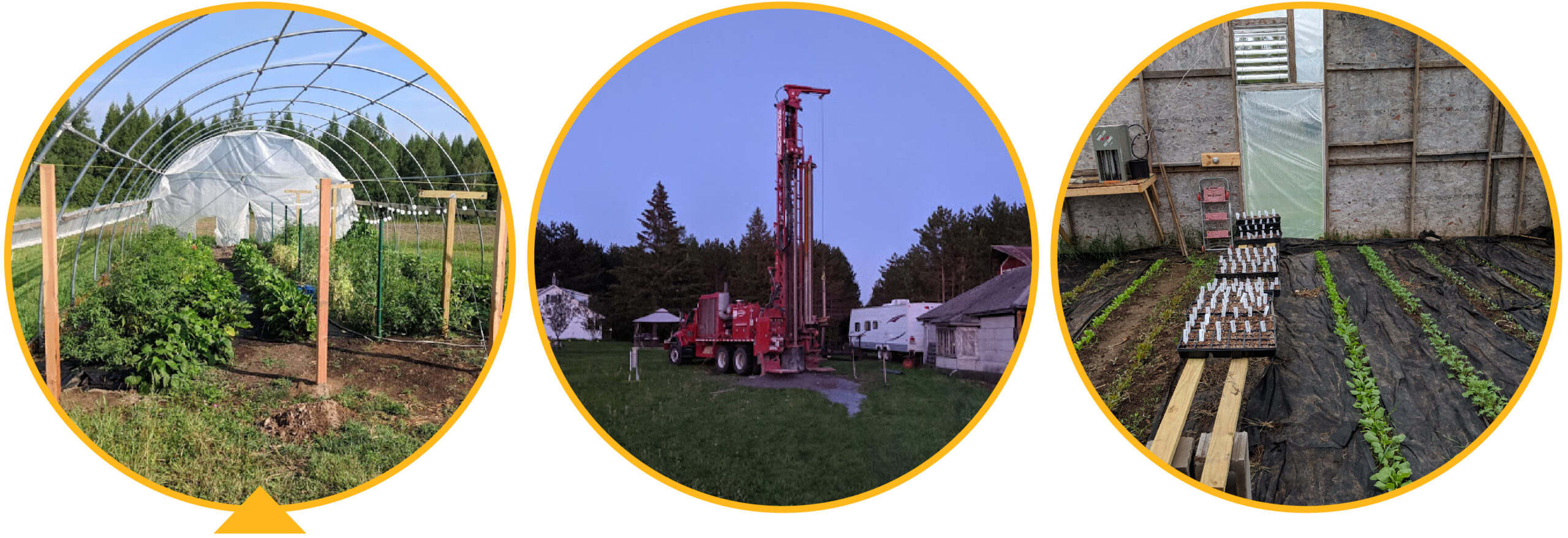
Early Frost Farm
Farmer: Jack LaMar
Embarrass, MN
Project: Drill a new well in order to install new irrigation equipment which will service two hoop houses, an adjacent field, and vineyard.
Total funded: $6,205
Were you able to complete the project for which you requested the LOFF grant? Tell a bit about the process.
Our well project did not go completely as planned. Our existing well and test drilling that was done indicated the well depth needed to be about 50 – 80 feet. However, the final depth of the well was 325 feet.
The pump is working as expected and water is flowing to the hydrants. It has certainly been a blessing not having to carry 5 gallon buckets of water to the barn every night for our laying flock. During the 2021 season, we will be able to use the hydrant that was installed by the hoop houses to feed our drip irrigation system. That system will be installed as we plant this coming spring.
How can co-op shoppers better support small farms like yours today and in the future, and how can they engage with your farm specifically?
Co-op shoppers can continue to support small farms, like ours, by going to farmer’s markets, visiting U-pick operations, sharing Facebook or other social media pages, participating in a CSA and just talking with the farmer about their farm and farming practices. We also love for people to come and visit and take a tour, and purchase products sold straight off the farm.
Thank you for giving us the opportunity to tell our story and for supporting us and farms like ours.
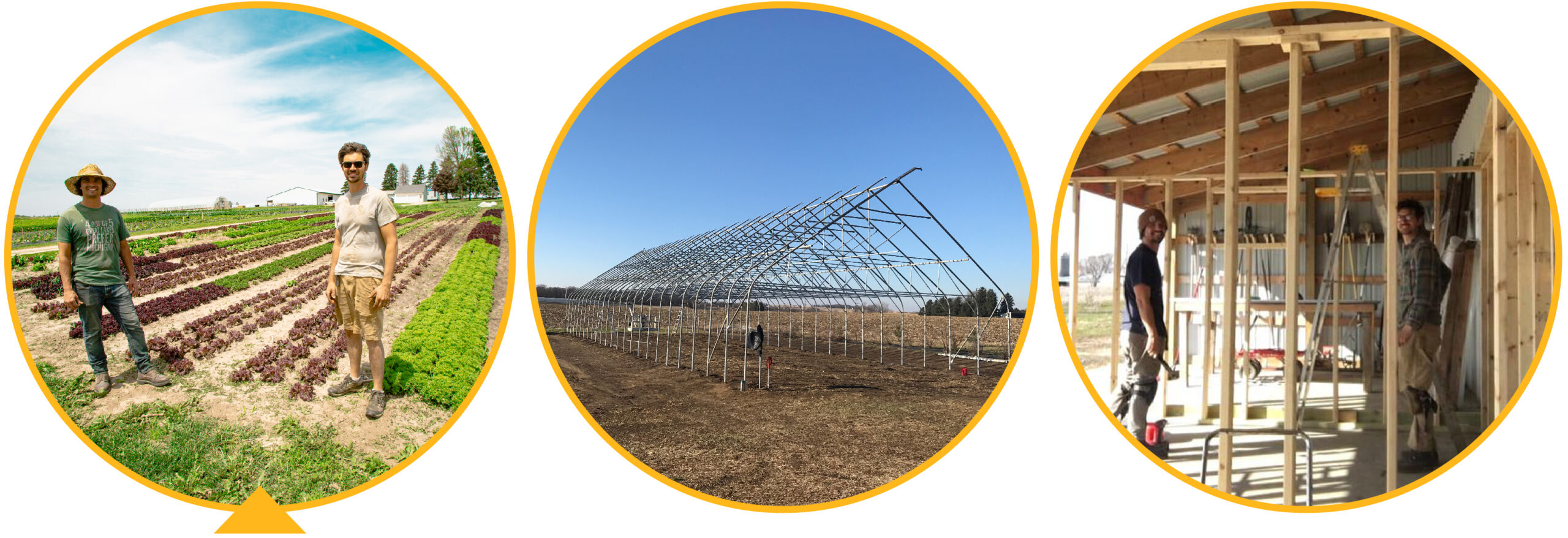
Pine Creek Farm
Farmers: Johnathan Stensgard and Jordan Flynn
Plainview, MN
Project: Expand and improve produce storage system on their 5 acre certified organic vegetable farm with the construction of a walk-in cooler and cooler trailer.
Total funded: $7,251
Were the funds used in the way you’d originally planned, as laid out in your LOFF application? If not, please explain.
The first half, or the cooler room, was! The second half, which we had planned for using on a new cooler trailer, was not. Throughout the season we realized that Farmers Markets can be inconsistent so we directed our efforts to wholesale markets. We decided that another tomato high tunnel would end up being the better decision so we used the other 40% on getting the frame up this past fall! We plan on finishing it this next spring (2021).
How has the completion of the project affected your farm?
The cooler room has been a blessing. It enables us to store all of our veggies at the right temperatures and dramatically increases our efficiency as the room is right next to our wash station. The high tunnel is also going to benefit us for years to come!
What would you say to co-op shoppers about the importance of supporting local farms?
Buying local is by far the most important thing we as individuals can do in the fight versus climate change. A tomato that was picked 30 miles away instead of 2,000 is not only going to taste a lot better but it will save on transportation, packaging, and will steer the markets in the direction of supplying more local products, which in the end will put money back into our local economy.
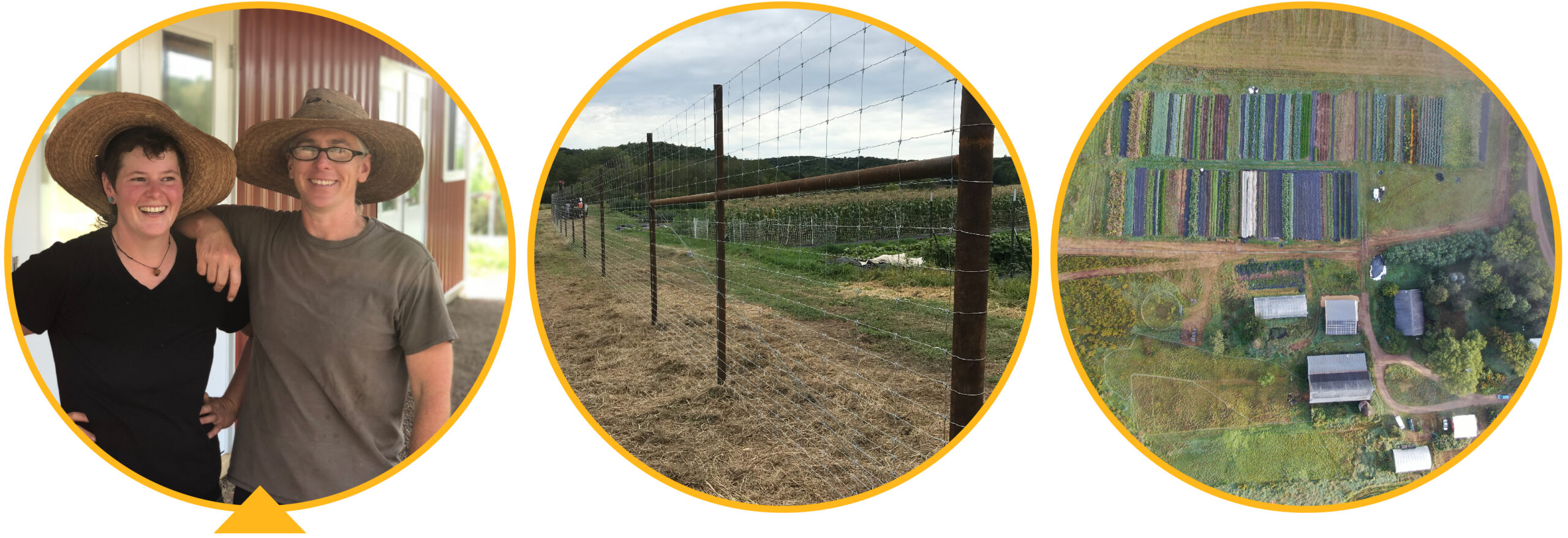
Racing Heart Farm
Farmers: Les Macare and Els Dobrick
Colfax, WI
Project: Install a deer fence to protect 17 acres of vegetable crops, pasture, and their regenerative orchard.
Total funded: $8,000
How has the completion of the project affected your farm?
We could immediately see from hoof prints that the fence was effective! Deer are now being diverted around our field, and we anticipate 100% reduction in crop loss from deer in 2021.
Do you have any quantitative data or other measurable outcomes related to the project, the impact it has had (or will have) on your farm?
We should be able to compare lost income for vegetables from deer damage after next season, but we anticipate this will save us from about $3,000 of damage per season per year. This project will also allow us to plant trees and other perennials in the additional fenced 15 acres, increasing biodiversity and potential income streams in the next 5-15 years.
What would you like to say to co-op shoppers?
The global pandemic has drawn back the curtain on how fragile the global food system is. We may have escaped the worst-case scenario of long term food shortages, but that doesn’t mean we should return to business as usual. Investing in a local food system is the best insurance we have, for our own health, the health of our local economy, and the health of our planet.
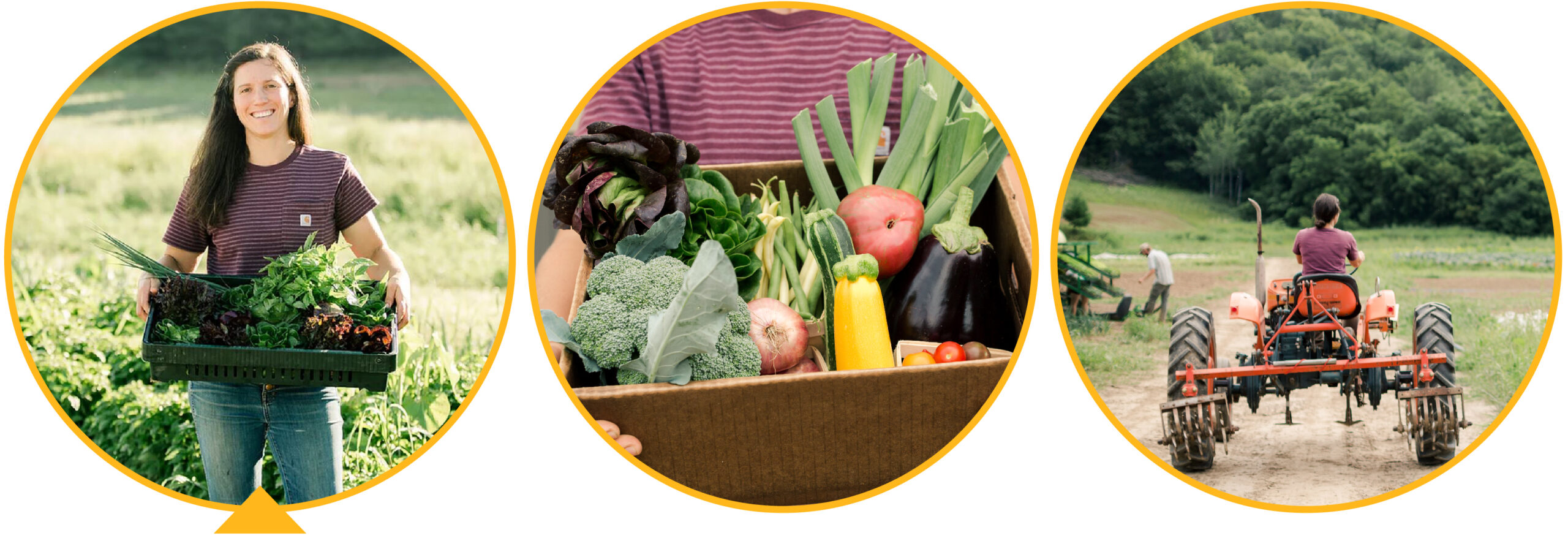
Pearson Organics
Farmer: Kristin Pearson
Lake City, MN
Project: Purchase washing and packing equipment, including a barrel washer, brush washer, feed belt, inspection conveyor, and rotary sorting table.
Total funded: $8,000
Overall, how did this year go for your farm? What changed for your farm as a result of the pandemic?
We definitely had to change our plans in the spring. I reduced my plan for restaurant sales and instead focused on selling more CSA shares. CSA shares in 2020 were hugely successful, and the farmers market was different but people showed up! Our other wholesale accounts remained solid.
Were you able to complete the project for which you requested the LOFF grant? Tell a bit about the process.
We used the funds to purchase equipment for our new wash pack shed. We purchased an entire brush washing line and barrel washer, which are now cozily nestled in our new pole barn. We were able to use the brush washing line for most of the season. The barrel washer was not delivered until early October, so we were able to utilize it for some storage crops, but we look forward to all of the time it will save us next season.
How has the completion of the project affected your farm?
The equipment has saved us a tremendous amount of time already. We ramped our production big time this year, so efficiency was very important. The equipment not only saved us time, but saved our bodies from having to do unnecessary lifting, hunching, and more.
Do you have any quantitative data or other measurable outcomes related to the project, the impact it has had (or will have) on your farm?
[In 2020,] we more than doubled our acreage [by moving to new farmland] and almost tripled our income without doubling our labor needs. This was largely due to the time-saving equipment the grant helped us purchase and some other valuable equipment we invested in this season.
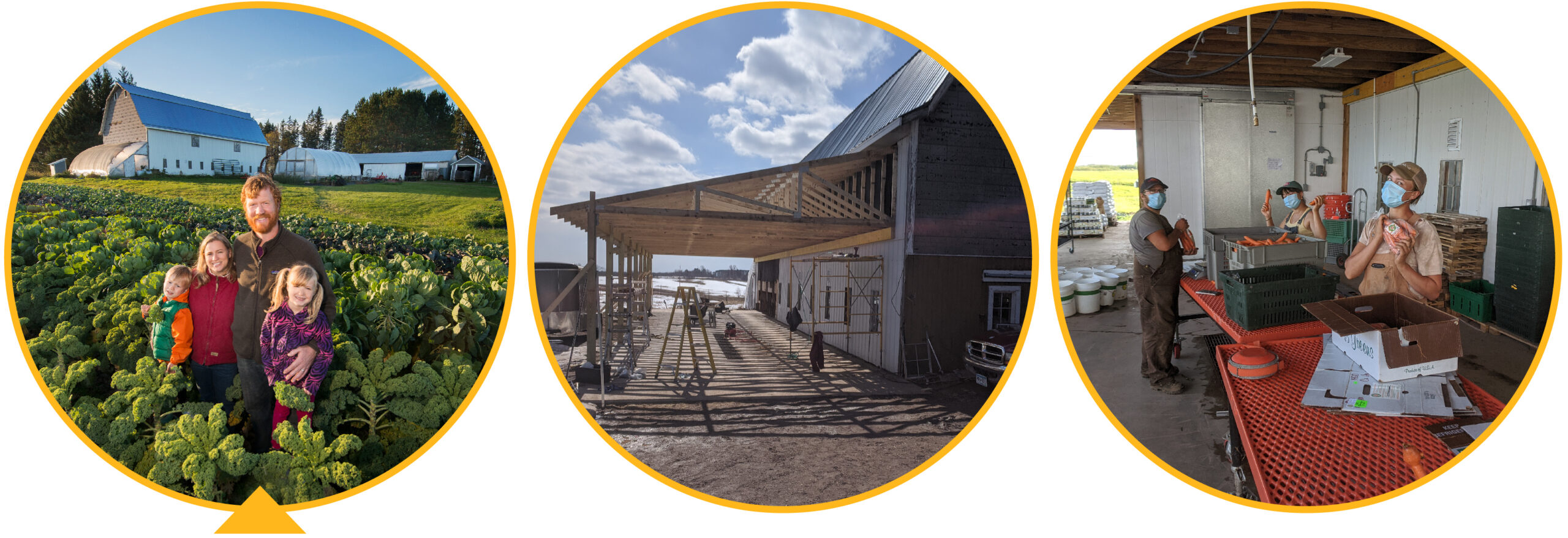
Northern Harvest Farm
Farmer: Rick Dalen
Wrenshall, MN
Project: Build a new pack shed and walk-in cooler to replace the on-farm facilities they’ve outgrown.
Total funded: $8,000
Overall, how did this year go for your farm? What successes did you experience on your farm? What challenges did you face?
We were able to complete construction on the pack shed in early summer. By the end of the season we had a pretty good handle on all the new systems and equipment in place around the new facility. It has been a year of major growth for our farm, mainly in terms of increasing our production capacity into the future.
It’s really difficult to make the financial side of things work in small-scale agriculture, but this project has helped move us closer to this goal.
How has the completion of the project affected your farm?
It set the stage for a major leap in production capacity, made many of the major functions on the farm run more efficiently, and also just made our work less strenuous and more enjoyable.
What would you like to say to Lakewinds owners and shoppers?
We so appreciate the grant we received from you folks, it helped out tremendously. One other thing I should mention, our local co-op, Whole Foods Co-op in Duluth, was inspired by your grant program and is working to start a similar program! They mentioned this in their summer newsletter: https://wholefoods.coop/cms/wp-content/uploads/2020/07/2020-Summer-Garbanzo-Gazette-ISSU.pdf
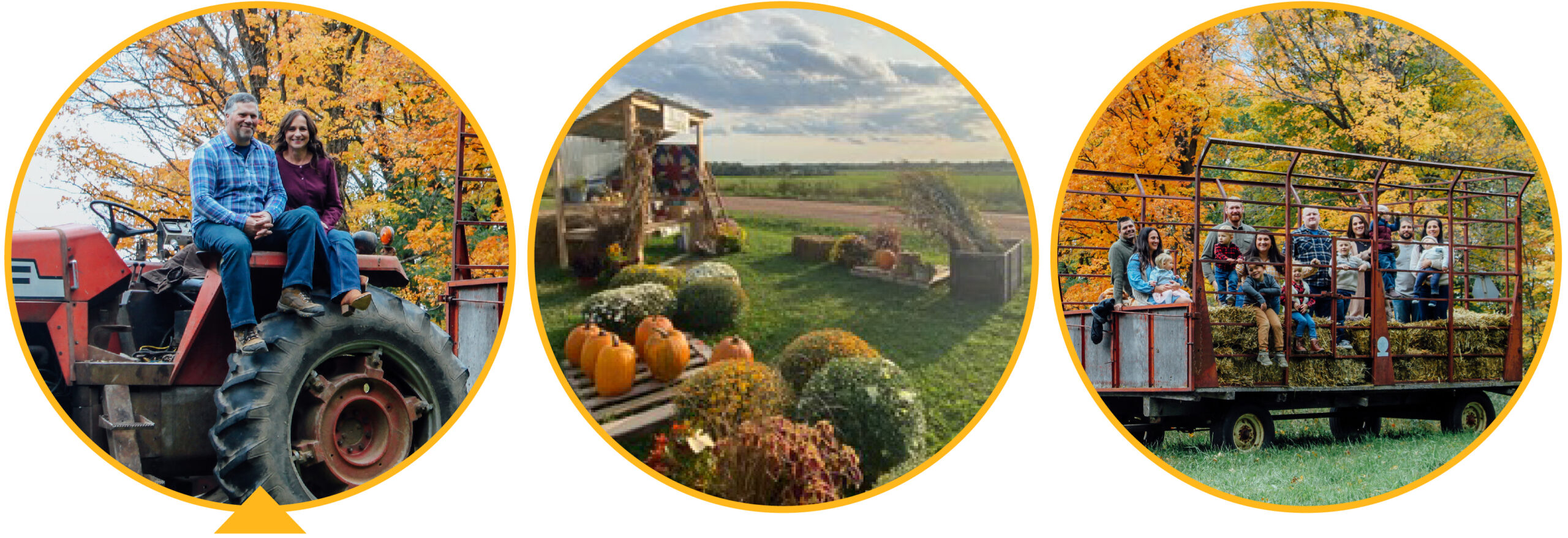
Echo Acres
Farmer: Joellen Van Galder
Aniwa, WI
Project: Purchase a tractor with bucket attachment to help with day-to-day operations on their organic dairy farm.
Total funded: $8,000
How has the completion of the project affected your farm?
By April we purchased a used tractor and bucket with the funds. We were able to make our hay crop better, faster, and more efficient. [This year] we were able to sell some of the excess hay crop, which in the past we have not been able to do. In past years milk out-put during winter decreased dramatically. Because of the better hay crop and bailage of oats and peas our cows are continuing to produce milk.
Another exciting event that happened at Echo Acres late summer was the addition of our road side market called, The Farm Stand. We sell organic certified pasture raised dairy, beef, chicken, eggs, veggies, fruits, flowers, and vintage decor. Most items are raised on our farm. We were embraced by our community when we opened.
What would you like to say to Lakewinds owners and shoppers?
I cannot thank LOFF enough for the grant funds. They literally breathed new life into our farm and gave us hope for the future. The grant was the boost we needed to continue our dairy farm. Adding The Farm Stand has been a dream of mine for years. During this chaotic time in the world it offered an outlet for myself, daughters and grandchildren to work on something else and still spend time at the farm. It is so exciting for our entire family.
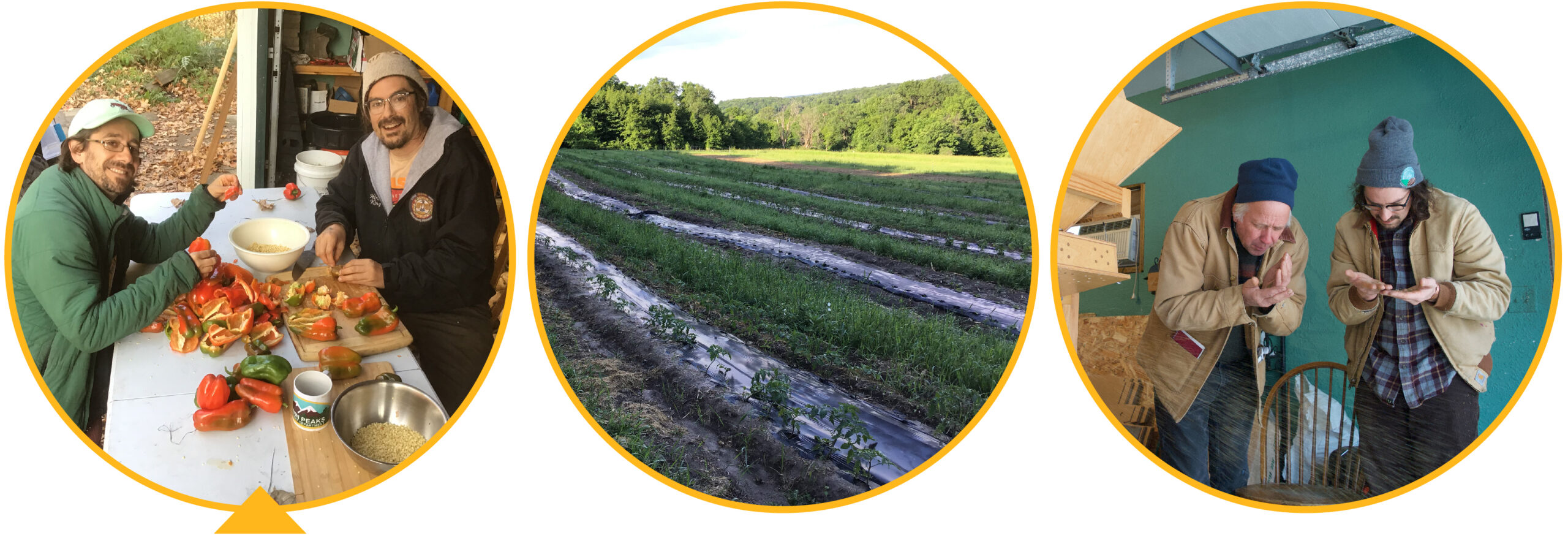
North Circle Seeds
Farmer: Zachary Paige
Vergas, MN
Project: Install hydrant to provide irrigation in their fields and high tunnel.
Total funded: $7,250
Overall, how did this year go for your farm? What successes did you experience on your farm? What challenges did you face?
Our 2020 season was our best season yet. We tested and grew more varieties for seed production as well as breeding trials for future years. We are adding 31 new varieties to our seed catalog, and we got certified organic this year!
How has the completion of the project affected your farm?
I am selling 30 new varieties this year and couldn’t have done it without the fertigation system with drip irrigation [and] this funding. 62% of our new varieties were irrigated because of the irrigation from LOFF funding, [and] 23 varieties out of the 42 varieties we grew at North Circle Farm were irrigated under the new irrigation system, which is 55% of our total varieties.
How can co-op shoppers better support small farms like yours, and how can they engage with your farm specifically?
Supporting regionally adapted organic seed is more important now than ever. We grow the vast majority of our seed right here in northern Minnesota, with a few organic varieties from Michigan. We choose to breed, select, and sell organically bred seeds for certified organic or non-chemical (sustainable) farmers and gardeners to collectively develop a seed supply that ‘holds up’ to organic systems in our region. These seeds are hardier and will withstand the pressures of disease and pest damage way better than seeds produced in conventional systems that use chemicals as part of the breeding.
Look for North Circle Seeds for sale at our Minnetonka and Chanhassen locations during spring 2021!
Thank you, Lakewinds shoppers and owners, for supporting the co-op and our work in the local food system. We are able to support local, small-scale farmers through community giving programs like LOFF because of your patronage.
Learn more about the Lakewinds Organic Field Fund and find other 2020 LOFF recipients here, or watch our 2020 LOFF video below.
